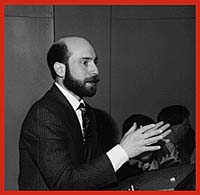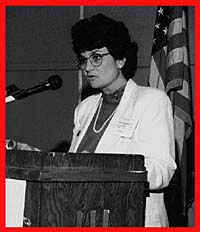
Volume 1 � Issue 1
Automated One of the traffic industry's hot topics, as well as one of the more well-attended sessions in Albuquerque, is the use of automated enforcement, or cameras, to combat red light running. Public opinion surveys by the Insurance Institute for Highway Safety (IIHS) have revealed wide acceptance and support for red light cameras; 66 percent of over 1,000 people polled in a nationwide random telephone survey said they favor use of the cameras, compared to 28 percent who opposed. RLR sites Polk County, FL, San Francisco, CA, and Jackson, MI, are among the areas in the nation that are currently utilizing red light cameras. RLR pilot site Charleston, SC, is also beginning to install the cameras at intersections throughout their community. Polk County site coordinator Capt. George Ferris, along with Richard Retting of the IIHS and David Smith of the FHWA's Office of Technology Applications, participated as a panelist on the Albuquerque workshop that dealt with this topic-Augmenting Enforcement with Technology-and provided some helpful resources and materials.
Richard Retting, IIHS For example, a brand-new update to the IIHS study that appeared in your Strategic Planning Guide has been issued. Titled "Red Light Running and Sensible Countermeasures: Summary of Research Findings," it is dated April 1996, and it provides a brief summary of recent research efforts to examine the problem of red light running and the use of countermeasures such as red light cameras to reduce the problem. Also, David Smith provided information on red light camera manufacturers in the US, Europe, and South Africa. Contact names and numbers are listed for your convenience. For a copy of either of these documents, call your Global Exchange Marketing Consultant at (301) 656-3100. If any of you are planning to produce a video segment or news clip to forward to local television stations or to use at any press event, the IIHS has made available a "b-roll" videotape of red light violations, red light camera enforcement, and crash footage. Please contact the IIHS Communication Dept. at (703) 247-1500 to receive your copy. |
Aggressive Driving According to a recent article from The Washington Post, an increase in Washington area moving violation citations was attributed to increases in enforcement efforts and more aggressive and reckless drivers. Washington area drivers received almost 30 percent more speeding tickets in 1995 than the year before, and citations for aggressive behavior-reckless driving, tailgating and running red lights- increased throughout the area as well. After years of being lost in the spotlight of other "higher-profile" crimes, traffic violations are becoming a priority for police departments. In the Washington area, recent well-publicized incidents involving drivers, including a shooting death and a multi-car collision stemming from arguing drivers, have raised fears among commuters and prompted law enforcement officials to devote more resources to ticketing violators. In a survey for AAA earlier this year, 40 percent of Washington area motorists called aggressive drivers their main highway safety concern, even more serious than drunk drivers. Marilena Amoni, director of NHTSA's Office of Enforcement and keynote speaker at the Albuquerque RLR workshop, was quoted in The Post's article, citing a gradual rise in drivers' average speeds. "Is aggressive driving getting worse? It probably is, and we're seeing it in these increases," Marilena said in the article.
This concern legitimizes the timeliness of our RLR campaigns and their importance throughout the country. Take advantage of this "hot" news topic and draft an op-ed piece or article that you can send to your local newspapers. Bring up this concern in presentations to the media and during other RLR presentations. This may help your campaign receive additional placement or airtime in media outlets that have already covered the campaign or get into mediums that have not yet expressed interest. |
|
Federal Highway Administration
|

